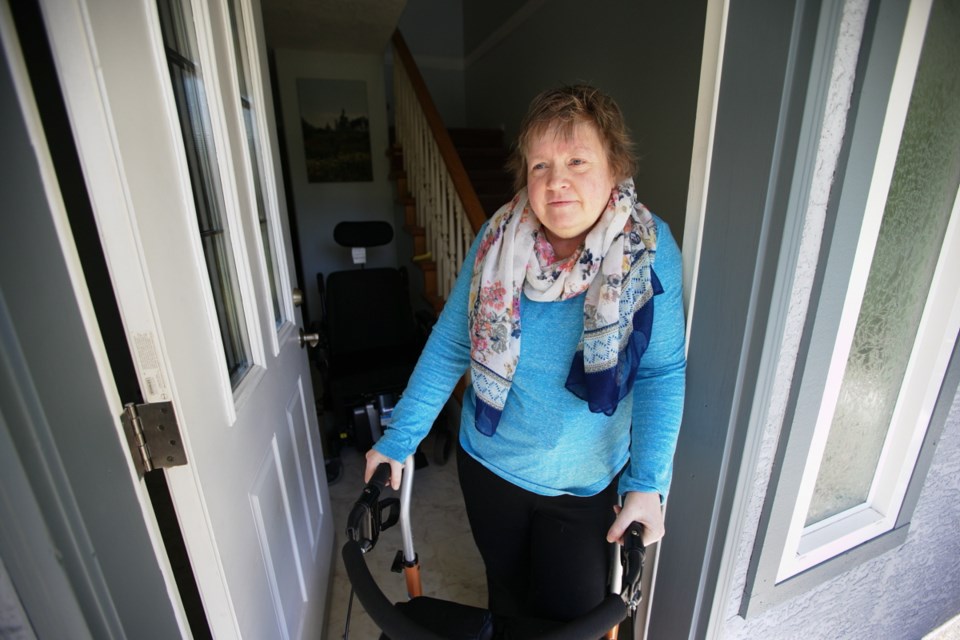Marilyn Kowalchuk is facing eventual immobility and death, but she also has to look out for her ailing husband’s welfare and plan for her only daughter’s future.
To make matters worse, the former Ontario nuclear-plant project engineer has been told that she will have to pay $1,500 a week for the whey-reduced formula she may need when she loses the ability to swallow.
Kowalchuk, who is 59, was diagnosed nine months ago with ALS, also known as Lou Gehrig’s disease. It is a terminal and progressive neuromuscular disease in which nerve cells die and leave voluntary muscles paralyzed.
Her doctor has told her she might lose mobility in about a year, although everyone reacts differently to the disease. ALS Canada says the lifespan after diagnosis can be two to five years. Death is usually caused by respiratory failure.
Kowalchuk’s condition has made it impossible for her to look after her 54-year-old husband, Rod Podhorodeski, who has multiple sclerosis.
Podhorodeski was diagnosed with MS in his early 20s. He was an engineering professor at the University of Victoria before he had to go on long-term disability about five years ago.
After a month in respite care last fall, Podhorodeski went to the Heights at Mount View care facility on Carey Road in Saanich.
He’s younger than most people there, but it was the first space available within Island Health. Kowalchuk said her husband is mild-mannered and needs an advocate. She’s not happy with his care and is working to improve that.
She also has to look after herself, and the high cost of the formula she will need came as a shock, just as her illness did.
Last August, Kowalchuk was walking and noticed one foot was dropping, like dead weight. She visited her doctor. Three months later, her ALS had been diagnosed.
“It happens that quickly,” she said.
Today, she uses a walker inside and a power wheelchair outside. Last month, Kowalchuk had a feeding tube surgically implanted to prepare for the day when she won’t be able to eat.
That tube could be costly to her, because she is allergic to whey, a key ingredient in most feeding-tube formulas.
Kowalchuk wants to stay home as long as possible, but there is a catch: In a hospital, the cost of whey-reduced commercial formula would be covered by health insurance. At home, the same formula would cost up to $1,500 a week, Kowalchuk said.
Island Health spokeswoman Kellie Hudson said all clients in B.C. who are not on disability income assistance are responsible for paying for their own tube-feed formula and supplies.
“The palliative benefits program does not cover tube-feeding supplies and formula either,” she said.
People at home are responsible for paying for their own medical supplies, just as they would be for meals, medications and wound dressing, said Hudson in an email.
Persons on disability income assistance might be eligible for support with some medically necessary items and equipment.
Kowalchuk said she could not get a straight answer on whether friends and family could prepare her whey-free feeding tube smoothies for care aides to administer, but Hudson said that could be arranged.
And if a client is in a facility, including the hospital, and medically stable, it is possible to arrange for people to bring home-blended formula, said Island Health.
Home and community care dietitians can work with clients to help them find a suitable formula or home-blended tube-feed recipe, Hudson said. As well, registered dietitians can train clients and caregivers on tasks such as tube feeding.
Kowalchuk said she’s been told many contradictory things, and wants to untangle the bureaucratic web for the next person with food allergies who has to be tube fed.
But solving this problem will not end her worries.
Kowalchuk is worried that her daughter will be forced to leave university and take a low-paying job to look after her parents, that she’ll be robbed of her carefree existence and her future career.
Kowaluck also worries about the need to look after her husband and sort out her estate.
She sobs upon hearing her story laid out.
Months ago, Kowalchuk said, she couldn’t talk about her diagnosis. Counselling helped, as did her project engineering background, which helped her focus on the individual parts of the task ahead, rather than the entire task.
“I look at everything as a project and that helps separate the day-to-day issues from the emotional part,” Kowalchuk said.
“That’s how you do it, you separate the two.”
And when she can’t, she has a good cry. “I even cry at sappy movies now.”



